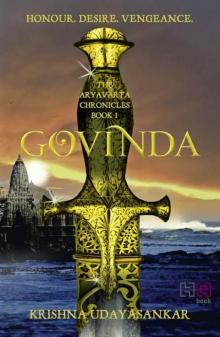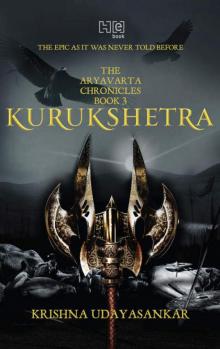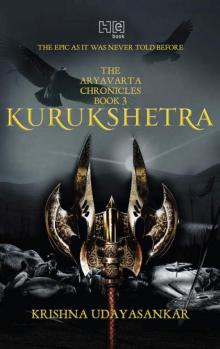- Home
- Krishna Udayasankar
The Aryavarta Chronicles Kaurava: Book 2 Page 5
The Aryavarta Chronicles Kaurava: Book 2 Read online
Page 5
The need fuelling his quick, firm strides, Dharma entered the building that served as his private residence. Panchali smiled as he came in to the study. He returned the gesture with affection and a hint of desire in his eyes. Her years were yet to take a toll on her, and she had remained the shapely, attractive woman whose smouldering beauty had once drawn every king and prince in the realm to compete for her hand, the utility of having her father as an ally notwithstanding. Her dark skin reflected a golden glow from the huge bronze chandelier overhead, making her look like a fiery mirage. The silk of her red robes seemed to glide lovingly over her smooth skin, and her long hair rested in a heavy knot at the nape of her neck, highlighting the strong but graceful line of her shoulders.
Unable to resist her proximity, Dharma ran a finger over her full lower lip and then pulled her into a passionate embrace.
She protested, ‘Patience! There’s work to be done. Besides,’ she teased, ‘it’s a short wait till nightfall…’
Reluctantly, Dharma let go of her and turned his attention to the scroll she handed him for his seal of assent. He frowned as he read through it. ‘What is this?’ he snapped.
Panchali said, ‘As you can see, this is a decree removing all taxes and tolls throughout the empire on goods made by the Naga ironsmiths. The current tolls and taxes that the kings of the various nations impose are far beyond the capacity of individual ironsmiths and craftsmen. They have no choice but to sell their wares to the saamantas and vassal chieftains at a ridiculously low price, or else work as bonded labour in their forges. The vassal lords, on the other hand, can well afford to make the investment and reap the benefits tenfold, if not more. If we don’t do away with the toll, our new empire will only serve to to make rich lords richer. It doesn’t hurt the imperial treasury in any way – in fact, as a sort of inducement, we could even offer to reduce the levies we impose on these kings. The increase in charges paid by foreign merchants to the empire for the right to trade here will more than make up for any loss of revenue to us.’
Dharma stared at the scroll as he considered Panchali’s words. He had no doubt that her simplified statement of the situation came more from her belief that he knew what she was talking about than a lack of understanding or analysis on her part. In fact, he would not be surprised if he found that she had already consulted with his advisors, even his brothers, before putting this proposal before him. Nevertheless, she had failed to see the basic problem, one that had nothing to with the wealth of the empire.
Drawing in an irritated breath, he began, ‘You want me to remove taxes… No, wait, let me restate that. You want me to interfere in the internal affairs of one of Aryavarta’s nations, at the risk of enraging all the monarchs in the realm, so that the Nagas can defy their lords and their rightful king Takshaka, to whom they owe allegiance by law and scripture? If this is a joke, Panchali, it’s in rather bad taste…’
‘Maybe we should have thought of that before moving the Nagas out of Kandava or walking on the roads they helped build in order to conquer the far reaches of our empire. Don’t we now owe something to those who toiled for us? Aren’t the Naga subjects your subjects too, Emperor Dharma?
Forcing back his anger, Dharma tried to explain, ‘No subjects will be served by destroying the moral and spiritual fabric of Aryavarta!’
‘But…’
‘Have you seen this?’ He reached into his waistband and took out a small ring of black iron, which he threw on the table between them.
Panchali picked it up. Trying her best to conceal her excitement, she ran her fingers over the dark metal band and the rough engravings on the ingot at its bezel. ‘It’s a ring. Of no consequence, I may add.’ She was intentionally disdainful. It served the purpose.
Dharma snatched it from her and, with an expression of disgust, slid it on to his finger. He fumbled with it a little, but finally managed to set it with the round ingot turned inwards, resting partly on his palm. Using his thumb, he pressed down on an indiscernible catch set into the band. At the same time, he curled his fingers tight, pressing on the ingot. A sudden flick of his wrist, and his palm was open.
Fire.
It spluttered up as a small tongue of flame, an iridescent haze of blue coming from the ring itself. It lacked ethereal beauty, the floating appearance of what was known in legend as the dancing flames of Agneya, the so-called magical fire the Firewrights could invoke and hold in the palm of their hands. The mechanism used here was a poor imitation of the fine craft of the Wrights, but Panchali’s eyes lit up. The ring was no less a marvel for her – a marvel of science without the illusion of sorcery. It was possible to see, explain and understand its function without relying on lores of celestials and demons.
‘Hara be praised,’ she finally gushed. Breathless and excited, Panchali held out her hand, asking to take a closer look at the ring, but Dharma moved his hand away, closing his fist tight as he did so. Panchali looked up at his face to realize that something was wrong. ‘You don’t look pleased, Dharma. Every era of prosperity has come on the wings of new inventions and discoveries, be they farming implements or wind-driven barges. Surely, this is what you as the Emperor dream of, to raise Aryavarta’s fortunes back to the great heights of the Golden Age, and make it a land of progress and peace once again?’ To consign these lands to the depths of Kali, the age of blackness, is not a dream, Panchali. It is a nightmare. This…this abomination is Wright-work!’
‘What is it with you and this obstinate hate for what the Wrights created? Oh, Rudra forbid that we use Wright-work to light hearths in dark homes rather than burn down forests and fields for some noble conqueror! Hai!’ She knew her sarcasm would hit a sore point by reminding Dharma of the times he had relied on Wright-weaponry to build the empire, but she didn’t care.
Dharma stood his ground. ‘What I did wasn’t for selfish reasons and it certainly was not to challenge the Divine Order. I have always acted with the blessings of the Vyasa himself and if Wright-work was involved, it was merely a means to further the purpose, the righteous purpose of the Firstborn. It wasn’t a profane attempt to harness the elements, the powers of nature, to suit human conveniences or to change destiny.’
‘Destiny? Is it our destiny to never aspire to anything more than what our forefathers had? What about using the alloys that make up weapons like the Gandiva bow to create splints, or even surgical instruments that make incisions and blood-letting easier, more precise and painless? Or use those very same metals to make faster chariots and ships, not for war and conquest but for trade and travel?’
‘I once found your innocence rather becoming, Panchali. You were young, and your idealism had…a…what’s the word…passion. Yes, you had passion, a fervour that was compelling. But you are the Empress now and I can’t go on indulging your childish ideas. You’re not a fool. You must learn to see what is best for you, for us, for Aryavarta…’
‘Which is?’
‘Your ideas of so-called equality and prosperity will do nothing but erode our way of life. It will destroy the Divine Order that we replicate in the earthly spheres.’
‘Do you hear yourself, Dharma? Your thoughts move like a blinkered horse…’ Panchali was incredulous. ‘You sound like Dwaipayana, the Vyasa! What are you, his lackey?’
‘I am true to what my teacher has taught me. We both serve the Divine, and we equally oppose the same evils. As for being a lackey, perhaps Govinda Shauri would like to hear these ideas of yours. Oh! I forget…you told him never to set foot in these lands while you are empress, or so I hear.’ His earlier anger against Govinda took hold of him, and words he did not quite mean spilled out of him. ‘Why did you do that, Panchali? Don’t you need him anymore now that you are Empress? Or did you simply tire of him?’
‘I told him to leave because I had to,’ Panchali said quietly. She added, for lack of other words to explain, ‘This is your empire, Dharma. He does not belong here.’
Her reply touched a chord, for Dharma shook his head mournfully. �
��You think you’ve banished Govinda from these lands? When will you realize that he is far from gone? Govinda Shauri is very much here, Empress. He is inside you. I hear him in your speech, and I see the fire of his soul in your eyes. Did you know that once upon a time, in the days when the Universe was very young, the gods themselves inhabited the Earth, just as the other domains? It was over time that they took to the skies along with the celestials, leaving the Earth to men and the netherworld to demons. Maybe it is true, and maybe not, but it is reason enough, all these centuries later, to find prosperity by following a path of duty and virtue, to maintain the order that has been set. What the Wrights did was contrary to the Divine Order. No matter how great their utility, it does not justify a return to their methods or devices. And that is why things must be the way they are, do you understand? Panchali, trust me. I say this for your own good.’
‘And what does your duty demand of you, Dharma?’
‘My duty demands that I keep the empire intact and stable. If this means overlooking upheavals and conflict, so be it. My duty is not to a single individual or a group, but to all of Aryavarta. I can’t remove taxes on these products as you ask.’
To his disappointment, Panchali was neither convinced nor intimidated by his rhetoric. ‘As you wish, Dharma,’ she said. With an elaborate and unneccessary bow she left the room.
Dharma stared after her till she disappeared from his sight. His jaw was set in uncharacteristic resolution and a vein throbbed in his temple as he willed himself not to call her back. Aryavarta. This was an empire of the Firstborn, of the faithful and devoted. There was no room here for heathen heretics, no room for Firewrights or their legacies. This, he noted with sullen determination, was his empire.
6
A SLEEPLESS PANCHALI GAZED DOWN FROM HER TERRACE – ONE of the tallest in the city – at the wonder that was Indr-prastha or the White City, as it was now known outside Aryavarta. Visitors marvelled at the way the city’s man-made structures blended tastefully with both the natural undulations of the land and the varying hues of cultivated gardens and wild forests.
From where she stood, Indr-prastha appeared like a wave-filled sea with crescents of smooth, shimmering white, and troughs of deep, soothing green. Each wave was a cluster of white towers of varying heights separated from others by well-planned verdure. Further away were the walls that bound the city in a perfect square. Creepers and ivy climbed up the sides of the walls in dark patterns to blend into the green walkways on top. Filled with their reflections, during the day, the waters of the still, clear moat surrounding the outer side of the wall sparkled like a green jewel. Yet, the city’s pleasant form was not without function. The clustered arrangement of buildings allowed for parts of it to be held even when others might be breached, the verdure served as gathering space for armies, the creepers and walkways along the city walls hid sharp metallic spikes, and the placid moat had been lined with tiny but deadly barbs that could well be mistaken for fallen leaves or moss. Indr-prastha was as deadly as it was lovely, and not even its many residents knew of its dark secrets as they went about their incessant activities.
It was still some time to dawn, but the bustle of life and light had merely slowed down, not stopped. Lanterns lined the sides of the major roads like golden pearls, and even the smaller pathways were dimly lit at the least. Even in the deepest night, the city remained safe for an endless tide of visitors and the citizenry that welcomed them with open arms. Indr-prastha never slept.
The empire never sleeps. Those bound by servitude must always remain awake, Panchali reminded herself, running a hand over her eyes. Of late, she felt constantly on the verge of tears, which was uncharacteristic of her. She told herself that it was because she was tired and overworked, stifling the tiny voice inside, which she knew spoke the truth. She had betrayed and been betrayed. But what haunted her was that she did not know to whom she owed the greater loyalty and, thus, who it was she had so miserably failed.
Soft footsteps made her turn. She smiled at the bearded scholar who approached her. He looked exactly like his older brother, but not entirely so. Dhaumya, royal priest in the court of Emperor Dharma Yudhisthir, had a kindness in his eyes that Devala the Firewright completely lacked.
‘Is it not too late for a man of renunciation to be out and about, Acharya?’ Panchali said.
‘Too late, yes, Mahamatra,’ Dhaumya replied, ‘but not to early. My day begins early, for I must tend to the gods before I can tend to the affairs of men…and women. I saw one of your attendants was up, and she told me that you were too. I don’t suppose you want a sleeping draught?’ he joked as he came to stand next to her.
Panchali raised an eyebrow. ‘Haven’t you filled us all up with that stuff already?’
‘There’s always room for more.’
The two laughed and a comfortable silence fell between them.
‘Tell me, Acharya,’ Panchali said after a while. ‘What do I still not know about the conspiracies around me?’
‘Conspiracy is a strong word, Empress. Besides, haven’t you already guessed all there is to know?’
‘I’ve had my suspicions, many of which have been confirmed. The question is, dare I take the last step and ask you a question?’
‘In my opinion, you should.’
‘Are you a spy, Dhaumya?’ Panchali’s manner was commanding and matter-of-fact, as only a ruler’s could be. Neither condescending nor overbearing, neither soft nor imposing, she was deceptively simple in her speech.
Dhaumya chuckled. ‘A spy? Surely, you don’t suspect me of treachery and intrigue?’ he asked.
‘Not at all. I leave those things to our common acquaintances. Of you, I expect intelligence and delicate but incisive action. I expect great loyalty to the one you’ve decided to serve, though perhaps even he knows it not.’
‘And who might such an ignorant master be?’
‘A stubborn gwala? For argument’s sake, let’s call him Govinda. Now, what would you deem your actions?’
‘My duty, Empress,’ Dhaumya said. ‘A greater duty than the one I may have to any master. The duty I owe to the truth, just as you do. To truth and justice.’
Panchali nodded at his graceful win. She asked, ‘Does that make me your enemy now?’
‘Because you defied Govinda? Because you think you thwarted his plans?’
‘Aren’t these sufficient reasons?’
‘They are good reasons, yes. But not sufficient.’
Panchali laughed at the wordplay. It felt good to share what lay on her mind frankly and with a touch of humour. She found herself opening up. ‘The Emperor refuses to remove the taxes on goods produced by the Nagas… I’d thought that I could get Dharma to agree… Not only did he oppose it, but he also did so most vehemently. He still associates science with Wright-work.’
‘Hmm.’
‘Hmm?’
‘Give him time, Panchali. Now that Devala has been found and arrested, the Firstborn will slowly begin to see that there is no one to fear. Soon Dharma will realize this too, and not too long after many will begin thinking the same way. They will reach out and aspire to greatness and glory, and that will require science to fuel it. When that happens, Aryavarta will rise beyond its former splendour to heights we’ve never dreamt of. There is,’ he added philosophically, ‘immense virtue in fearlessness.’
Panchali considered the scholar’s quiet confidence even as old words echoed in her mind: You think power and might lies only in armies and brute force? Prosperity can be power too. Out loud she said, ‘You expected this, didn’t you?’
‘I did. Or rather, I should say…’
‘Govinda did,’ Panchali finished. ‘I feel like a fool, Dhaumya. I still don’t know whether I did right or wrong. Govinda said he dreamt of an empire built on the might of the Firstborn and the Firewrights, both. But is that not treachery or, at the least, foolishness? Tell me, please, what have I been so blind to? What have I failed to understand?’
‘I normally wou
ldn’t dare respond to that question, especially when it’s posed by a monarch,’ Dhaumya jovially began, ‘but in your case, I’ll trust in our long acquaintance and share my thoughts with you.’ He paused, thinking, and then continued, ‘Panchali, all of our scriptures can be condensed into one simple principle… One above all.’
‘The notion of a supreme maker, the power that was there even before existence came into being…’
‘Precisely. Now, I have no complaints about the statement; in fact, I shall accept it for what it is. But when you think of the body of philosophy that stems from this one principle, there are issues we can’t ignore. The scriptures it has spawned are all creations of mankind – earthly creations, if you will. They weren’t set down by this supreme power, but by the seers of old. I suppose one could call them hymns of information and adoration. We sing in praise of the Supreme, and we also speak of the greatest act of this Supreme Being – the act of creation, a creation that encompasses Swarga, the celestial realm, Earth, and Patala, the netherworld. From this principle, we derive the notion of Divine Order, of life on Earth mirroring the dance of all Creation. And there lies the problem. The moment we are ready to accept the notion that existence is divided into inferior and superior beings, a hierarchical system that is divinely orchestrated as the pinnacle of perfection, we start believing in domination and hierarchy as being moral and righteous. We submit to the gods and to those chosen by the gods. Rather than question this system, we use the notion of divine predestination to explain things – which is precisely what the Firstborn do. They believe in a world based on this Divine Order, and their role in it as ensuring it remains such. Even if it means believing in things that not everyone agrees is just and fair…’

 Govinda (The Aryavarta Chronicles)
Govinda (The Aryavarta Chronicles) The Aryavarta Chronicles Kaurava: Book 2
The Aryavarta Chronicles Kaurava: Book 2 The Aryavarta Chronicles Book 03: Kurukshetra
The Aryavarta Chronicles Book 03: Kurukshetra The Aryavarta Chronicles Kurukshetra: Book 3
The Aryavarta Chronicles Kurukshetra: Book 3